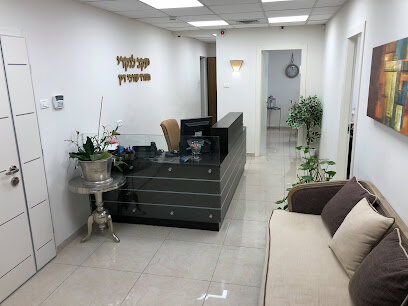Best Landlord & Tenant Lawyers in Afula
Share your needs with us, get contacted by law firms.
Free. Takes 2 min.
Free Guide to Hiring a Real Estate Lawyer
List of the best lawyers in Afula, Israel
About Landlord & Tenant Law in Afula, Israel
Landlord and tenant issues in Afula follow national Israeli tenancy principles together with local municipal rules. Most disputes arise from written or oral lease agreements, rent payment, security deposits, repairs and maintenance, illegal occupancy and eviction procedures. Afula tenants and landlords must comply with national statutes, general contract law and local administrative practices such as municipal tax obligations. Practical outcomes often depend on the lease terms, the history of payments and the specific facts of each case, so many disputes are resolved either through negotiation, mediation or litigation in the local magistrate court.
This guide explains common situations, what the law typically requires, where to get help locally and the steps to take if you need legal assistance in Afula. It is intended to be informative and not a substitute for personalized legal advice from a qualified local attorney.
Why You May Need a Lawyer
Landlord-tenant matters can become complex quickly because they mix contract law, property law and procedural rules for courts and enforcement. You may need a lawyer if you face any of the following situations:
- Eviction notices or court proceedings - whether you are a tenant facing eviction or a landlord seeking to recover possession of a property.
- Nonpayment of rent or disputed rent claims - to evaluate legal remedies, negotiate settlements and prepare court documents.
- Security deposit disputes - to calculate lawful deductions, demand return of deposits and, if necessary, sue for recovery.
- Habitability and repairs - to enforce the landlord's obligation to maintain safe and livable premises or to defend against tenant claims for rent reduction or repairs paid by the tenant.
- Lease drafting or review - to ensure lease clauses are enforceable, comply with Israeli law and reflect your commercial or personal priorities.
- Subletting, assignment and short-term rental issues - to clarify rights and liabilities under your lease and to address municipal rules and tax considerations for platforms such as short-term rentals.
- Complex property ownership structures, multiple claimants or inheritance-related tenancy disputes - which may require property law expertise and coordinated litigation.
A lawyer can advise you on likely outcomes, prepare or review legal documents, represent you in mediation or court, and help enforce judgments through the execution office or local enforcement bodies.
Local Laws Overview
Key legal aspects relevant to landlord and tenant matters in Afula reflect Israeli national law and municipal practice. Important points to understand include:
- Lease agreements - Leases may be written or oral, but a clear written contract that specifies rent, duration, notice periods, repair obligations and payment of municipal charges reduces disputes. Standard commercial and residential provisions are enforceable so long as they do not violate overriding statutory protections.
- Security deposits - Security deposits are commonly requested by landlords to secure performance. Typical practice in Israel is for deposits to equal a limited number of months rent, but exact permissible amounts are governed by contractual agreement and principles of good faith. Landlords must account for lawful deductions and return remaining funds after tenancy ends.
- Rent increases - Rent adjustment clauses are generally enforced if included in the lease, and may be tied to indices or contractual formulas. For older protected rent contracts, different statutory protections can apply. Always check the lease and seek legal advice before accepting or contesting increases.
- Repairs and habitability - Landlords have a duty to keep rented premises habitable and to perform major repairs. Tenants generally must perform minor maintenance and report defects. If a landlord fails to act, tenants may have remedies such as requesting repair and offsetting costs, claiming rent reduction or seeking a court order for repairs.
- Right of entry - Landlords cannot enter occupied premises without the tenant's consent except in emergencies. Reasonable notice and scheduling are required for inspections or repairs. Disputes about unlawful entry can lead to claims for breach of privacy and damages.
- Eviction and enforcement - Evictions generally require a court order. Self-help eviction - such as changing locks or physically removing a tenant - is unlawful and can lead to criminal and civil liability. Once a court judgment is obtained, enforcement is handled through the execution office and local bailiffs.
- Municipal charges - Local municipal taxes such as arnona are set by the municipality. Who pays arnona - landlord or tenant - depends on the lease agreement. Disputes over these charges should be resolved by reference to the lease and, if needed, by legal action.
- Brokerage and commissions - Real estate broker commissions are a common feature of rental transactions. Typical practice is for tenants to pay a broker commission equivalent to a set portion of the annual rent, but terms should be confirmed in writing. Disputes over commissions are contractual and can be litigated.
- Short-term rentals and permits - Short-term or holiday rentals may trigger additional municipal rules, licensing requirements and taxation responsibilities. Landlords and tenants involved in short-term rentals should confirm municipal policies and lease permissions before proceeding.
Frequently Asked Questions
How do I legally evict a tenant in Afula?
To evict a tenant you must follow legal procedure. Start by checking the lease for termination terms and sending any required notices. If the tenant does not vacate, you will generally file a claim in the local magistrate court seeking possession and any unpaid rent. If you obtain a judgment, enforcement is carried out by the execution office or bailiff. Do not use self-help measures like lockouts, since those can lead to liability. Consult a lawyer early to ensure correct notice and procedural steps are taken.
What can a landlord deduct from a security deposit?
Landlords may deduct amounts reasonably related to unpaid rent, damage beyond ordinary wear and tear, unpaid utility or municipal charges they are contractually responsible for, and documented cleaning or repair costs. Keep invoices and photographic evidence. Disputed deductions can be challenged in court, where the tenant may seek the return of the deposit or damages for wrongful withholding.
Can a tenant withhold rent if the apartment needs repairs?
Withholding rent is risky and should be done only after legal advice. Tenants typically must first notify the landlord and give a reasonable opportunity to repair. If the landlord fails to act, legal remedies may include seeking a rent reduction, arranging repair and deducting reasonable costs subject to proof, or filing a claim in court. A lawyer can advise on the safest approach given the facts.
How much notice must a landlord or tenant give to terminate a lease?
Notice periods depend on the lease terms and whether the lease is fixed-term or periodic. For fixed-term leases, termination usually occurs at the end of the term unless the lease allows early termination. For periodic tenancies, leases often specify notice periods. When no term is specified, general principles of reasonable notice apply. Review your lease and consult a lawyer to confirm the correct notice period and method of delivery.
Who is responsible for arnona and utility payments?
Responsibility for arnona and utilities is determined by the lease. Many leases assign arnona to the tenant, while others leave it with the landlord. If the lease is silent, parties should negotiate or seek legal clarification. Keep records of payments and copies of receipts. Disputes may be resolved by contract interpretation or court action.
Can a landlord enter the apartment without permission?
No. A landlord should not enter a rented apartment without the tenant's consent except in emergencies. Reasonable notice should be given for inspections or repairs. Repeated or intrusive entry may violate the tenant's right to quiet enjoyment and privacy and can be the basis for a legal claim.
Is subletting allowed in Afula?
Subletting depends on the lease terms and the nature of the tenancy. Many leases require the landlord's written consent before a tenant sublets. Some types of rental contracts and public housing arrangements impose specific restrictions. If you are considering subletting, check your lease, obtain necessary consents and consult a lawyer to avoid breach of contract and possible eviction.
What should I do if a broker claims a commission after I signed the lease?
Review the broker agreement or the receipt of services. Brokerage commissions are contractual. If you did not agree to pay the commission or were misled, gather any communications and documents and seek legal advice. Disputes can often be resolved by negotiation or may proceed to court if necessary. Keep copies of all messages and receipts related to the brokerage arrangement.
Are there special rules for short-term rentals like holiday lets?
Short-term rentals may involve additional municipal rules, safety requirements and tax obligations. Some municipalities require permits or registration for short-term rentals and may limit them in certain zones. Leases should expressly allow short-term use if the tenant intends to sublet on platforms. Obtain local guidance and legal review before operating short-term rentals to avoid fines or contractual disputes.
Where do I file a landlord-tenant dispute in Afula?
Most landlord-tenant disputes are filed in the local magistrate court, which handles residential and small civil claims in the area. For matters involving protected tenancies or larger property issues, other courts may have jurisdiction. You can also consider mediation or small claims procedures for lower-value disputes. A local attorney can advise on the correct forum and help prepare your case.
Additional Resources
When you need further help locally in Afula, consider these resources and bodies that commonly assist with landlord-tenant matters:
- Afula Magistrate Court - the local court that hears many landlord-tenant disputes and issues related enforcement orders.
- Afula Municipality - municipal offices can assist with arnona queries, municipal permits and local regulations affecting rental properties.
- Ministry of Construction and Housing - national body that oversees housing policy and may have guidance on public housing and construction standards.
- Israel Land Authority - relevant when tenancy involves state land or public property arrangements.
- Israel Bar Association - offers lawyer referral services and information on finding a qualified local attorney.
- Local legal aid clinics and community organizations - these may provide low-cost or pro bono assistance for eligible individuals.
- Consumer protection and tenant advocacy organizations - for general advice and support in disputes with landlords, brokers or service providers.
Next Steps
If you need legal assistance in Afula, use the following practical steps to move forward:
- Gather your documents - collect the lease, payment receipts, deposit records, correspondence with the landlord or tenant, photographs of the property and any notices received or sent. Clear documentation is essential.
- Identify the immediate issue - is the problem nonpayment, repairs, eviction, an unlawful entry or a broker dispute? The right remedy and filing timeline depend on the issue.
- Seek an initial consultation - contact a local attorney experienced in landlord-tenant law for a case assessment. Ask about fees, likely options and procedural timelines.
- Consider negotiation or mediation - many landlord-tenant disputes are resolved faster and at lower cost through negotiation or mediation rather than court. A lawyer can negotiate on your behalf and draft binding settlement terms.
- If court is necessary - your lawyer will advise on the proper forum, prepare pleadings, gather evidence and represent you at hearings. Understand enforcement mechanisms and likely timeframes for judgment and execution.
- Preserve rights and avoid self-help - do not attempt lockouts or other self-help remedies. Follow legal notice requirements and court procedures to protect your position.
- Use local resources - consult municipal offices for arnona issues and local legal aid clinics if cost is a concern. For complex property or public housing matters, contact the relevant national body for guidance.
Getting the right legal advice early improves your chances of an efficient outcome. If you are unsure where to begin, compile your documents and schedule an initial meeting with a solicitor who handles landlord and tenant matters in Afula.
Lawzana helps you find the best lawyers and law firms in Afula through a curated and pre-screened list of qualified legal professionals. Our platform offers rankings and detailed profiles of attorneys and law firms, allowing you to compare based on practice areas, including Landlord & Tenant, experience, and client feedback.
Each profile includes a description of the firm's areas of practice, client reviews, team members and partners, year of establishment, spoken languages, office locations, contact information, social media presence, and any published articles or resources. Most firms on our platform speak English and are experienced in both local and international legal matters.
Get a quote from top-rated law firms in Afula, Israel — quickly, securely, and without unnecessary hassle.
Disclaimer:
The information provided on this page is for general informational purposes only and does not constitute legal advice. While we strive to ensure the accuracy and relevance of the content, legal information may change over time, and interpretations of the law can vary. You should always consult with a qualified legal professional for advice specific to your situation.
We disclaim all liability for actions taken or not taken based on the content of this page. If you believe any information is incorrect or outdated, please contact us, and we will review and update it where appropriate.










